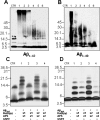Grape-derived polyphenolics prevent Abeta oligomerization and attenuate cognitive deterioration in a mouse model of Alzheimer's disease
- PMID: 18562609
- PMCID: PMC2806059
- DOI: 10.1523/JNEUROSCI.0364-08.2008
Grape-derived polyphenolics prevent Abeta oligomerization and attenuate cognitive deterioration in a mouse model of Alzheimer's disease
Abstract
Alzheimer's disease (AD) is a neurodegenerative disorder characterized by progressive impairments in memory and cognition. Extracellular accumulation of soluble high-molecular-weight (HMW) Abeta oligomers has been proposed to be largely responsible for AD dementia and memory deficits in the Tg2576 mice, a model of AD. In this study, we found that a naturally derived grape seed polyphenolic extract can significantly inhibit amyloid beta-protein aggregation into high-molecular-weight oligomers in vitro. When orally administered to Tg2576 mice, this polyphenolic preparation significantly attenuates AD-type cognitive deterioration coincidentally with reduced HMW soluble oligomeric Abeta in the brain. Our study suggests that grape seed-derived polyphenolics may be useful agents to prevent or treat AD.
Figures



Similar articles
-
Heterogeneity in red wine polyphenolic contents differentially influences Alzheimer's disease-type neuropathology and cognitive deterioration.J Alzheimers Dis. 2009;16(1):59-72. doi: 10.3233/JAD-2009-0916. J Alzheimers Dis. 2009. PMID: 19158422 Free PMC article.
-
Moderate consumption of Cabernet Sauvignon attenuates Abeta neuropathology in a mouse model of Alzheimer's disease.FASEB J. 2006 Nov;20(13):2313-20. doi: 10.1096/fj.06-6281com. FASEB J. 2006. PMID: 17077308
-
Pine Bark Polyphenolic Extract Attenuates Amyloid-β and Tau Misfolding in a Model System of Alzheimer's Disease Neuropathology.J Alzheimers Dis. 2020;73(4):1597-1606. doi: 10.3233/JAD-190543. J Alzheimers Dis. 2020. PMID: 31958081 Free PMC article.
-
Novel role of red wine-derived polyphenols in the prevention of Alzheimer's disease dementia and brain pathology: experimental approaches and clinical implications.Planta Med. 2012 Oct;78(15):1614-9. doi: 10.1055/s-0032-1315377. Epub 2012 Sep 21. Planta Med. 2012. PMID: 23023952 Review.
-
Polyphenols as potential inhibitors of amyloid aggregation and toxicity: possible significance to Alzheimer's disease.Mini Rev Med Chem. 2008 May;8(5):429-35. doi: 10.2174/138955708784223512. Mini Rev Med Chem. 2008. PMID: 18473932 Review.
Cited by
-
Unveiling the Potential of Polyphenols as Anti-Amyloid Molecules in Alzheimer's Disease.Curr Neuropharmacol. 2023;21(4):787-807. doi: 10.2174/1570159X20666221010113812. Curr Neuropharmacol. 2023. PMID: 36221865 Free PMC article. Review.
-
Two different binding modes of α-synuclein to lipid vesicles depending on its aggregation state.Biophys J. 2012 Apr 4;102(7):1646-55. doi: 10.1016/j.bpj.2012.01.059. Epub 2012 Apr 3. Biophys J. 2012. PMID: 22500765 Free PMC article.
-
Neuroprotective Effects of Chronic Resveratrol Treatment and Exercise Training in the 3xTg-AD Mouse Model of Alzheimer's Disease.Int J Mol Sci. 2020 Oct 4;21(19):7337. doi: 10.3390/ijms21197337. Int J Mol Sci. 2020. PMID: 33020412 Free PMC article.
-
UGT84F9 is the major flavonoid UDP-glucuronosyltransferase in Medicago truncatula.Plant Physiol. 2021 Apr 23;185(4):1617-1637. doi: 10.1093/plphys/kiab016. Plant Physiol. 2021. PMID: 33694362 Free PMC article.
-
Characterization of Two Key Flavonoid 3-O-Glycosyltransferases Involved in the Formation of Flower Color in Rhododendron Delavayi.Front Plant Sci. 2022 May 16;13:863482. doi: 10.3389/fpls.2022.863482. eCollection 2022. Front Plant Sci. 2022. PMID: 35651780 Free PMC article.
References
-
- Bentivegna SS, Whitney KM. Subchronic 3-month oral toxicity study of grape seed and grape skin extracts. Food Chem Toxicol. 2002;40:1731–1743. - PubMed
-
- Bitan G, Lomakin A, Teplow DB. Amyloid beta-protein oligomerization: prenucleation interactions revealed by photo-induced cross-linking of unmodified proteins. J Biol Chem. 2001;276:35176–35184. - PubMed
-
- Cleary JP, Walsh DM, Hofmeister JJ, Shankar GM, Kuskowski MA, Selkoe DJ, Ashe KH. Natural oligomers of the amyloid-beta protein specifically disrupt cognitive function. Nat Neurosci. 2005;8:79–84. - PubMed
Publication types
MeSH terms
Substances
Grants and funding
LinkOut - more resources
Full Text Sources
Other Literature Sources
Medical
Molecular Biology Databases
